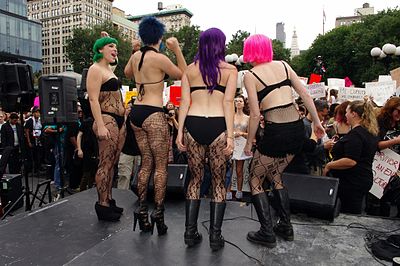
WEIGHT: 52 kg
Breast: B
1 HOUR:100$
NIGHT: +40$
Sex services: Cum on breast, Deep Throat, Golden shower (in), Pole Dancing, Disabled Clients
But at a moment when questions of sex and power, blame and credibility, and gender and justice are so ubiquitous and so urgent, I have mostly felt irritation that stripping down to skivvies and calling ourselves sluts is passing for keen retort. Though Hill offered only her own narrative about the behavior she witnessed, her story helped other women build a vocabulary and learn to talk about unjust sexual-power dynamics. Thanks in part to her, we were, by now, supposed to be braver and more skilled at calling out injustice, at exposing or reversing sexual-power imbalances.
I understand that SlutWalkers want to drain the s-word of its misogynistic venom and correct the idea it conveys: that a woman who takes a variety of sexual partners or who presents herself in an alluring way is somehow morally bankrupt and asking to be hit on, assaulted or raped. To object to these ugly characterizations is right and righteous. But to do so while dressed in what look like sexy stewardess Halloween costumes seems less like victory than capitulation linguistic and sartorial to what society already expects of its young women.

Scantily clad marching seems weirdly blind to the race, class and body-image issues that usually rightly obsess young feminists and seems inhospitable to scads of women who, for various reasons, might not feel it logical or comfortable to express their revulsion at victim-blaming by donning bustiers. So while the mission of SlutWalks is crucial, the package is confusing and leaves young feminists open to the very kinds of attacks they are battling.
That lack of precision and self-protection leapt out in another recent example of a woman grappling with issues of sexual power. In June, Good magazine published an online personal essay by Mac McClelland, a respected human rights journalist. In it, McClelland recounted how a series of assignments, especially a two-week stint in Haiti in which she spent time with a traumatized rape victim and fought off threatening, unwanted male advances herself, left her with post-traumatic stress disorder and the conviction that the only way to unravel the coil of debilitating anxiety in her chest was by having a consensual but violent encounter with a friend.

But the story read as if McClelland was so jumpy about writing it that she did so with eyes closed and face scrunched up, rushing to get the words out before she lost her nerve. It was odd, given that McClelland had not been raped herself, that the tenor of some of the attacks on her read like a compendium of invective commonly used to discredit actual rape accusers.
































